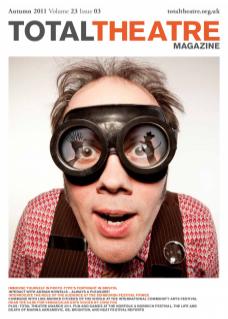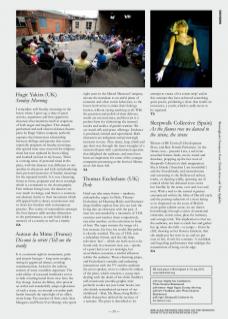BE Festival 2011 was an exhausting week of watching theatre, socialising, scoffing delicious food, negotiating European accents, making friends, discussing opinions, getting sweaty in workshops and stealing sleep on the festival sofas.
BE Festival is Birmingham’s first European Theatre festival and it is now in its second year at AE Harris, a warehouse venue in the Jewellery Quarter. Last year’s BE was a rough and ready, uber-friendly event that secured the festival a place in the yearly theatre calendar. It is run by three ambitious, warm and talented artists who bring an equally ambitious and friendly event to the city. This year’s BE was bigger than the last – packed full of performances from across Europe and events such as workshops, talks and feedback sessions scheduled throughout the day. Plus glorious food by London-based Blanch and Shock, who set up a catering van on site and had a blackboard menu translated into various languages by the visiting performers. BE is good for everybody – it’s good for West Midlands audiences who would normally have to travel further (and pay more) to see new European work, it’s good for the non-UK artists who would not normally get the opportunity to perform their work here, and it’s good for the UK-based artists to see their work presented in a contemporary European context.
BE’s format is unique for both artist and audience – the companies travel from their respective countries (with minimal set), are hosted by Birmingham families, are fed for free by the festival, perform half-hour versions of their work to audiences of about 200 per night, hear what audiences made of their work in the feedback session the next day, and then see selections of work by other practitioners the following evening. Each performing company is in the running for the two main festival prizes – a Development Prize of £1500 (which involves a residency at mac Birmingham to finish making the piece) and a Touring Prize: a European and UK tour supported by BE Festival. But for artists, the best thing about the festival is all the connections you can make and the conversations you can have with other companies and with audiences – in fact the theme of the festival is ‘crossing boundaries’. There’s an intimate, generous and passionate atmosphere that enables this to happen.
There are four half-hour performances per night, broken in the middle by dinner, and a gig afterwards by a Midlands-based band. In the daytime before the performances kick off there are workshops, talks and the feedback cafe – a lively meeting place where artists and audiences can ask the companies who showed work the previous night about their performances. Good coffee too.
One night’s shows are reviewed below – the programme presented on Thursday 7 July 2011 – a great selection of work in very different styles from UK, Spain and France.
Hagit Yakira (UK), Sunday Morning
I remember well Sunday mornings in the house where I grew up, a time of great activity, arguments and that oppressive closeness that manifests itself in eruptions of both anger and laughter. This sharply performed and well observed dance-theatre piece by Hagit Yakira company perfectly captures that bittersweet relationship between siblings and parents that seems especially poignant on Sunday mornings, that special time once reserved for religious ritual but now replaced by horse-riding and football (at least in my house). There is a strong sense of personal ritual in the piece, with the dancers very different to one another in character and look and plundering their personal memories of Sunday mornings for the repeated motifs. It is very charming, funny at times, poignant and never nostalgic which is a testament to the choreography. Free without being loose, the dancers are very much in charge, and there is a concrete-not-abstract clarity to their movement which will appeal both to dance connoisseurs and to those less familiar with contemporary practice. The variety of nationalities amongst the four dancers adds another dimension to the performance, as each body holds a memory of a country as well as a family.
EA
Autour du Mime (France), Dis-moi la vérité (Tell me the truth)
It is a common sight in restaurants, pubs and airport lounges – long-term couples, sitting in aggrieved silence, avoiding communication, locked in the tedious tension of some soundless argument. The cold edifice of seasoned familiarity serves to hide a battleground from view. Into the fray charge Autour du Mime, who present an artful and wonderfully adept exploration of such a scene, set around a wooden park bench beneath the sepia light of an olden street lamp. Two masters of their craft, Sara Mangano and Pierre-Yves Massip, who spent eight years in the Marcel Marceau Company, elevate the mundane to an artful plane of romantic and often comic behaviour, as the lovers both strive to make their feelings known, without saying anything at all. With the precision and polish of their delivery, words are not necessary, and their art is a perfect form for elaborating the internal tussles and tackles of gender warfare. We see stand-offs and peace offerings. Evidence is produced, refuted and reproduced. Both characters are indignant and protestingly innocent in turn. They dance, leap, climb and ape their way through the inner wrangles of a taciturn dispute with a professional expertise that delighted the audience, and must have been an inspiration for some of the younger companies presenting at the festival. Silence never felt more full.
TA
Thomas Eccleshare (UK), Perle
Grief can take many forms – madness, melancholia, anger. In Perle, Thomas Eccleshare (of Dancing Brick) and illustrator Serge Seidlitz explore how loss can lock the living into an obsession with the past. A man sits surrounded by a mountain of VHS cassettes and watches them compulsively, one after another, on the television in front of him. The tapes contain the image of a lost treasure, his love, his world. But pathos is cleverly avoided. The use of VHS, now a redundant format, and the old, deep, television ‘box’ – which are both soon to be found only in a museum near you – speaks of a past that is not yet nostalgia, but nevertheless occasions a wistful affection within the audience. These charming props, and Eccleshare’s comedic and endearing interactions with the TV and the audience (he never speaks), serve to soften the subject of the piece, which concerns a young man dealing with the death of his child. Seidlitz’s self-consciously juvenile graphic style perfectly evokes not just comic books, but also faintly remembered cartoons of our childhood – Bod, Mr. Benn, King Rollo – which themselves utilised the services of a narrator. The piece is described as ‘an attempt to create a live comic strip’ and in this attempt they have achieved something quite poetic, producing a show that recalls an innocence, a youth, which is sadly never to be regained.
TA
Sleepwalk Collective (Spain), As the flames rose we danced to the sirens, the sirens
Winner of BE Festival’s Development Prize, and Best Female Performer, As the flames rose... presents Lara, a red-wine-mouthed femme fatale, movie-toned and dissolute, propping up the bar stool of Sleepwalk Collective’s dark imagination. She is blonde (‘therefore I am irresistible’) and the Everyblonde, tied monochrome and screaming to the Hollywood railway tracks, or dancing wildly, spinning out of control whilst her debonair lover seizes her forcibly by the arms, over and over and over. With a nod to the surreal vignettes encountered within the films of David Lynch, and the purring seduction of a siren luring us to shipwreck on the coast of Berlin’s avant-garde cabaret scene, we are drawn bewitchingly through a series of emotional entreaties, comic turns, pleas for intimacy, and a magic trick. The implication is that we, the audience, are here to catch her and gather her up when she falls – or jumps – from the cliff, showing us her flowery knickers; that she might put her trust in us, and we put ours in her, if only for a minute. A confident and beguiling performance that indulges the romanticism of being on the edge.
EA
BE took place in Birmingham 4–10 July 2011. www.befestival.org


